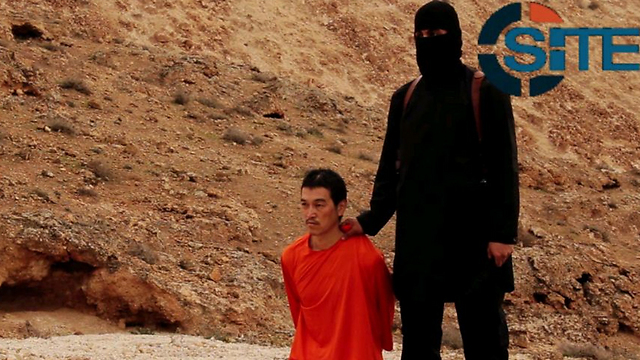Ideology of death is making a comeback
Yossi Shain lYnetnews/Published: 02.02.15/ Israel Opinion
Op-ed: As Islamist totalitarianism threatens the entire world, the absence of even a rhetoric promise or lip service for humanitarian intervention may indicate that the lessons of Auschwitz are becoming vague.
The images of brutal beheadings by Islamic State members, the killing among the Yazidi minority, the schoolgirls’ kidnapping and horrifying rapes by Boko Haram members in Nigeria, as well as other crimes committed proudly, in broad daylight, by the ISIS forces and similar groups, prove that brutal acts and unrestrained violence, and even threats of annihilation, are not only a thing of the totalitarian past.
For years, the Soviet Union succeeded in concealing the crimes committed under Joseph Stalin’s rule, including the mass starvation in Ukraine and southern Russia, which led to the death of 7 to 10 million people over the years.
We have only recently been exposed to the extent of the horrifying crimes of Chinese leader Mao Zedong, whose major “collectivization” program, which he forced on his people, led to the death by starvation of more than 45 million people.
Last week, the world marked 70 years since the liberation of the Auschwitz concentration camp. Historian Daniel Goldhagen, the author of the famous book “Hitler’s Willing Executioners,” wrote in the New York Times that those who believe that an efficient annihilation of the Jews required the Germans to build systems with mechanistic- bureaucratic qualities in the gassing installations are wrong. He noted that the Nazis murdered about 3 million Jews through nonindustrial brutality, including by the German killing units, the Einsatzgruppen, which followed the Germany army as it invaded the Soviet Union.
And yet, all the brutality mechanisms in the totalitarian regimes were backed by the annihilation theory. The Nazi “master race” concept, the Communist “economic determinism” and the Chinese cultural revolutionism of the “great leap forward” provided moral and institutionalized backing to mass killings.
Philosopher Johanna “Hannah” Arendt wrote that under a cover of total universal regularity, the Nazis and Communists justified brutal arbitrariness which human history had never seen before.
Twenty-five years ago, when the USSR collapsed, the United States and the West turned into the ideological rulers, for a short period of time; and in the 1990s, many people thought that the era of totalitarian ideologies which allowed genocide was over. Many also believed that the ideology of a civilized democratic world, backed by American military power, would put an end to the unrestrained brutality.
The Americans did intervene in favor of the Kurds in northern Iraq, after the first Gulf War. They also intervened “humanitarianly” in Somalia and Haiti, and in Bosnia and Kosovo, where they were too late. But the Americans and the entire West “missed out” on the efficient, quick and primitive mass murder in Rwanda, where the Hutu killed some 800,000 members of the Tutsi within two weeks. The West was also “late” in its response to the genocide in Darfur.
Clearly, brutality with the potential of genocide does not require a totalitarian ideology. It’s enough to mention the Turkish massacre of the Armenians and the genocide in Biafra. Yet is should be noted that our period is characterized by a return of the ideology which supports unrestrained annihilation to the center of the international stage. Such an ideology, which is common among the Islamists, provides an excuse for mass killing which is becoming a routine.
Many in the West still perceive the Islamist totalitarianism as marginal. They say that “Islam is a religion of peace,” that there are “extreme Muslims” but that the majority are “moderate.” They also talk about “radical Muslims” who react to the injustices of colonialism, and distinguish between “jihadists” and “Muslim brothers with a democratic orientation.”
The nuances are important: We must not generalize all the Muslims and we must not create a stigmatization of a culture struggle. Nonetheless, we must not blur the Islamist totalitarianism which is threatening the entire world.
Today, with the absence of even a rhetoric promise or lip service for humanitarian intervention, there is a fear that the lessons of Auschwitz are becoming vague.




















